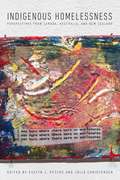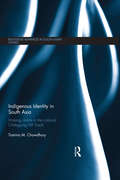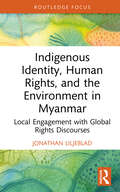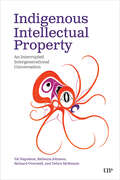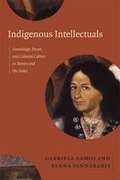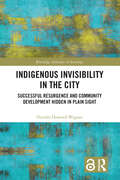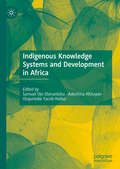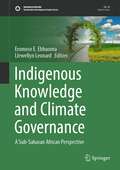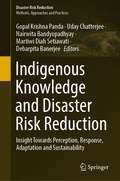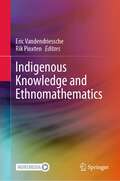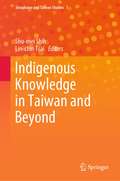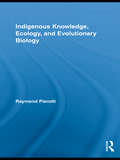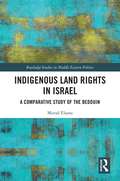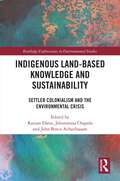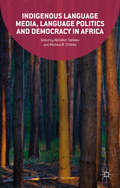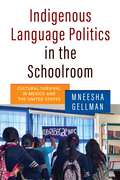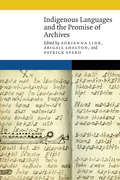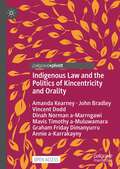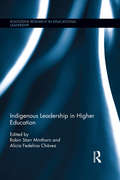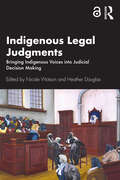- Table View
- List View
Indigenous Homelessness: Perspectives from Canada, Australia, and New Zealand
by Evelyn J. Peters Sarah Prout David Turner Rebecca Schiff Julia Christensen Paul Andrew Tim Aubry Yale Belanger Cynthia Bird Christina Birdsall-Jones Marleny M. Bonnycastle Deidre Brown Rebecca Cherner Patricia Franks Susan Farrell Joshua Freistadt Charmaine Green Kelly Greenop Shiloh Groot Darrin Hodgetts Selena Kern Pita Richard Wiremu King Fran Klodawsky Gabrielle Lindstrom Paul Memmott Daphne Nash Julia Parrel Mohi Rua Annette Siddle Maureen Simpkins Barbara A. Smith Wilfreda E. Thurston Alina Turner Jeanette Waegemakers Schiff Tiniwai Chas Te Whetu Rob WillettsBeing homeless in one’s homeland is a colonial legacy for many Indigenous people in settler societies. The construction of Commonwealth nation-states from colonial settler societies depended on the dispossession of Indigenous peoples from their lands. The legacy of that dispossession and related attempts at assimilation that disrupted Indigenous practices, languages, and cultures—including patterns of housing and land use—can be seen today in the disproportionate number of Indigenous people affected by homelessness in both rural and urban settings. Essays in this collection explore the meaning and scope of Indigenous homelessness in the Canada, Australia, and New Zealand. They argue that effective policy and support programs aimed at relieving Indigenous homelessness must be rooted in Indigenous conceptions of home, land, and kinship, and cannot ignore the context of systemic inequality, institutionalization, landlessness, among other things, that stem from a history of colonialism. "Indigenous Homelessness: Perspectives from Canada, New Zealand and Australia" provides a comprehensive exploration of the Indigenous experience of homelessness. It testifies to ongoing cultural resilience and lays the groundwork for practices and policies designed to better address the conditions that lead to homelessness among Indigenous peoples.
Indigenous Identity in South Asia: Making Claims in the Colonial Chittagong Hill Tracts (Routledge Advances in South Asian Studies)
by Tamina M. ChowdhuryIn the immediate aftermath of the creation of Bangladesh in 1971, an armed struggle ensued in its remote south-eastern corner. The hill people in the Chittagong Hill Tracts, more commonly referred to as paharis, demanded official recognition, and autonomy, as the indigenous people of the Tracts. This demand for autonomy was primarily based on the claim that they were ethnically distinct from the majority ‘Bengali’ population of Bangladesh, and thereby needed to protect their unique identity. This book challenges the general perception within existing scholarship that indigenous claims coming from the Tracts are a recent and contemporary phenomenon, which emerged with the founding of the Bangladesh state. By analysing the processes of colonisation in the Chittagong Hill Tracts, the author argues that identities of distinct ethnicity and tradition predate the creation of Bangladesh, and first began to evolve under British patronage. It is asserted that claims to indigeneity must be understood as an outcome of prolonged and complex processes of interaction between hill peoples – largely the Hill Tracts elites – and the Raj. Using hitherto unexplored archival sources, Indigenous Identity in South Asia sheds new light on how the concepts of ‘territory’, and of a ‘people indigenous to it’ came to be forged and politicised. By showing a far deeper historical lineage of claims making in the Tracts, it adds a new dimension to existing studies on Bangladesh’s borders and its history. The book will also be a key resource for scholars of South Asian history and politics, colonial history and those studying indigenous identity.
Indigenous Identity, Human Rights, and the Environment in Myanmar: Local Engagement with Global Rights Discourses (Routledge Focus on Environment and Sustainability)
by Jonathan LiljebladThis book draws on the experiences of the indigenous movement in Myanmar to explore how the local construction of indigenous identities connects communities to global mechanisms for addressing human rights and environmental issues. Various communities in Myanmar have increasingly adapted international discourses of indigenous identity as a vehicle to access international legal mechanisms to address their human rights and environmental grievances against the Myanmar state. Such exercise of global discourses overlays historical endemic struggles of diverse peoples involving intersectional issues of self- determination, cultural survival, and control over natural resources. This book draws implications for the intersectionality of local and global theoretical discourses of indigeneity, human rights, and environment. It uses such implications to identify attendant issues for the aspirations of international human rights and environmental efforts and the practice of their associated international legal mechanisms. This book informs readers of the agency and capabilities of communities in underdeveloped countries to engage different global mechanisms to address local grievances against their states. Readers will develop a more critical understanding of the issues posed by the local construction of indigeneity for the ideals and practice of international efforts regarding human rights and the environment. This book will be of great interest to students and scholars of indigenous studies, human rights, international law, Asian studies, development studies, and the environment.
Indigenous Intellectual Property: An Interrupted Intergenerational Conversation
by Val Napoleon, Rebecca Johnson, Richard Overstall, and Debra McKenzieHistorically, Indigenous artistic, cultural, and societal expression has been identified and examined within Canadian or international legal regimes. This book identifies Indigenous intellectual property concerns as an Indigenous legal issue to be taken seriously within specific Indigenous legal orders. Indigenous Intellectual Property opens up complex discussions about existing Indigenous intellectual property law, and avoids the tendency to pigeonhole Indigenous intellectual property into a Western legal model. Drawing on diverse case studies, this book considers the existing laws in the Gitxsan, Secwepemc, and Hupacasath (Nuu-chah-nulth) legal orders, as well as from the Solomon Islands and Hawai’i. The case studies are grounded in their respective legal and oral histories, and contextualized within a broader discussion of Indigenous law, addressing issues of colonial myths, shrinking conceptions of Indigenous law, common resistances to Indigenous property and law, and important connections between Indigenous law and governance and citizenship. The book carefully considers how the governance and civic value of intellectual property points to the unsuitability of the current state and international intellectual property legal regimes to many Indigenous intellectual property concerns. Ultimately, Indigenous Intellectual Property reveals the various ways in which to identify and understand law within Indigenous societies – through narrative and story analysis, observations of practices and ceremonies, and political and legal ordering.
Indigenous Intellectuals: Knowledge, Power, and Colonial Culture in Mexico and the Andes
by Yanna Yannakakis Gabriela RamosVia military conquest, Catholic evangelization, and intercultural engagement and struggle, a vast array of knowledge circulated through the Spanish viceroyalties in Mexico and the Andes. This collection highlights the critical role that indigenous intellectuals played in this cultural ferment. Scholars of history, anthropology, literature, and art history reveal new facets of the colonial experience by emphasizing the wide range of indigenous individuals who used knowledge to subvert, undermine, critique, and sometimes enhance colonial power. Seeking to understand the political, social, and cultural impact of indigenous intellectuals, the contributors examine both ideological and practical forms of knowledge. Their understanding of "intellectual" encompasses the creators of written texts and visual representations, functionaries and bureaucrats who interacted with colonial agents and institutions, and organic intellectuals.Contributors. Elizabeth Hill Boone, Kathryn Burns, John Charles, Alan Durston, María Elena Martínez, Tristan Platt, Gabriela Ramos, Susan Schroeder, John F. Schwaller, Camilla Townsend, Eleanor Wake, Yanna Yannakakis
Indigenous Intergenerational Resilience: Confronting Cultural and Ecological Crisis (Routledge Studies in Indigenous Peoples and Policy)
by Lewis WilliamsThis book argues that there is a need to develop greater indigenous-led intergenerational resilience in order to meet the challenges posed by contemporary crises of climate change, cultural clashes, and adversity. In today’s media, the climate crisis is kept largely separate and distinct from the violent cultural clashes unfolding on the grounds of religion and migration, but each is similarly symptomatic of the erasure of the human connection to place and the accompanying tensions between generations and cultures. This book argues that both forms of crisis are intimately related, under-scored and driven by the structures of white supremacism which at their most immediate and visible, manifest as the discipline of black bodies, and at more fundamental and far-reaching proportions, are about the power, privilege and patterns of thinking associated with but no longer exclusive to white people. In the face of such crisis, it is essential to bring the experience and wisdom of Elders and traditional knowledge keepers together with the contemporary realities and vision of youth. This book’s inclusive and critical perspective on Indigenous-led intergenerational resilience will be valuable to Indigenous and non-Indigenous interdisciplinary scholars working on human-ecological resilience.
Indigenous Invisibility in the City: Successful Resurgence and Community Development Hidden in Plain Sight (Routledge Advances in Sociology)
by Deirdre Howard-WagnerIndigenous Invisibility in the City contextualises the significant social change in Indigenous life circumstances and resurgence that came out of social movements in cities. It is about Indigenous resurgence and community development by First Nations people for First Nations people in cities. Seventy-five years ago, First Nations peoples began a significant post-war period of relocation to cities in the United States, Canada, Australia, and Aotearoa New Zealand. First Nations peoples engaged in projects of resurgence and community development in the cities of the four settler states. First Nations peoples, who were motivated by aspirations for autonomy and empowerment, went on to create the foundations of Indigenous social infrastructure. This book explains the ways First Nations people in cities created and took control of their own futures. A fact largely wilfully ignored in policy contexts. Today, differences exist over the way governments and First Nations peoples see the role and responsibilities of Indigenous institutions in cities. What remains hidden in plain sight is their societal function as a social and political apparatus through which much of the social processes of Indigenous resurgence and community development in cities occurred. The struggle for self-determination in settler cities plays out through First Nations people’s efforts to sustain their own institutions and resurgence, but also rights and recognition in cities. This book will be of interest to Indigenous studies scholars, urban sociologists, urban political scientists, urban studies scholars, and development studies scholars interested in urban issues and community building and development.
Indigenous Invisibility in the City: Successful Resurgence and Community Development Hidden in Plain Sight (Routledge Advances in Sociology)
by Deirdre Howard-WagnerIndigenous Invisibility in the City contextualises the significant social change in Indigenous life circumstances and resurgence that came out of social movements in cities. It is about Indigenous resurgence and community development by First Nations people for First Nations people in cities.Seventy-five years ago, First Nations peoples began a significant post-war period of relocation to cities in the United States, Canada, Australia, and Aotearoa New Zealand. First Nations peoples engaged in projects of resurgence and community development in the cities of the four settler states. First Nations peoples, who were motivated by aspirations for autonomy and empowerment, went on to create the foundations of Indigenous social infrastructure. This book explains the ways First Nations people in cities created and took control of their own futures. A fact largely wilfully ignored in policy contexts. Today, differences exist over the way governments and First Nations peoples see the role and responsibilities of Indigenous institutions in cities. What remains hidden in plain sight is their societal function as a social and political apparatus through which much of the social processes of Indigenous resurgence and community development in cities occurred. The struggle for self-determination in settler cities plays out through First Nations people’s efforts to sustain their own institutions and resurgence, but also rights and recognition in cities. This book will be of interest to Indigenous studies scholars, urban sociologists, urban political scientists, urban studies scholars, and development studies scholars interested in urban issues and community building and development.This book is available for free in PDF format as Open Access from the individual product page at www.routledge.com. It has been made available under a Creative Commons Attribution-Non Commercial-No Derivatives 4.0 license.
Indigenous Knowledge Production: Navigating Humanity within a Western World (Routledge Advances in Sociology)
by Marcus Woolombi WatersDespite many scholars noting the interdisciplinary approach of Aboriginal knowledge production as a methodology within a broad range of subjects – including quantum mathematics, biodiversity, sociology and the humanities - the academic study of Indigenous knowledge and people is struggling to become interdisciplinary in its approach and move beyond its current label of ‘Indigenous Studies’. Indigenous Knowledge Production specifically demonstrates the use of autobiographical ethnicity as a methodological approach, where the writer draws on lived experience and ethnic background towards creative and academic writing. Indeed, in this insightful volume, Marcus Woolombi Waters investigates the historical connection and continuity that have led to the present state of hostility witnessed in race relations around the world; seeking to further one’s understanding of the motives and methods that have led to a rise in white supremacy associated with ultra-conservatism. Above all, Indigenous Knowledge Production aims to deconstruct the cultural lens applied within the West which denies the true reflection of Aboriginal and Black consciousness, and leads to the open hostility witnessed across the world. This monograph will appeal to undergraduate and postgraduate students, as well as postdoctoral researchers, interested in fields such as Sociology of Knowledge, Anthropology, Cultural Studies, Ethnography and Methodology.
Indigenous Knowledge Systems and Development in Africa
by Samuel Ojo Oloruntoba Adeshina Afolayan Olajumoke Yacob-HalisoThis edited volume analyzes African knowledge production and alternative development paths of the region. The contributors demonstrate ways in which African-centered knowledge refutes stereotypes depicted by Euro-centric scholars and, overall, examine indigenous African contributions in global knowledge production and development. The project provides historical and contemporary evidences that challenge the dominance of Euro-centric knowledge, particularly, about Africa, across various disciplines. Each chapter engages with existing scholarship and extends it by emphasizing on Indigenous knowledge systems in addition to future indicators of African knowledge production.
Indigenous Knowledge and Climate Governance: A Sub-Saharan African Perspective (Sustainable Development Goals Series)
by Llewellyn Leonard Eromose E. EbhuomaThis book investigates indigenous knowledge systems (IKS) in sub-Saharan Africa, thereby highlighting its role in facilitating adaptation to climate variability and change, and also demystifying the challenges that prevent it from being integrated with scientific knowledge in climate governance schemes. Indigenous people and their priceless knowledge rarely feature when decision-makers prepare for future climate change. This book showcases how Indigenous knowledge facilitates adaptation to climate change, including how collaborations with scientific knowledge have cascaded into building people’s resilience to climatic risks. This book also pays delicate attention to the factors fueling epistemic injustice towards Indigenous knowledge, which hampers it from featuring in climate governance schemes across sub-Saharan Africa. The key insights shared in this book illuminate the issues that contribute meaningfully towards the actualisation of the UN SDG 13 and promote mechanisms for raising capacity for effective climate change-related planning and management in sub-Saharan Africa.
Indigenous Knowledge and Disaster Risk Reduction: Insight Towards Perception, Response, Adaptation and Sustainability (Disaster Risk Reduction)
by Uday Chatterjee Nairwita Bandyopadhyay Martiwi Diah Setiawati Gopal Krishna Panda Debarpita BanerjeeThe book seeks to comprehend how indigenous knowledge systems of local communities can be effectively used in disaster management of various types. A prime example is the 2015 Sendai Framework for Disaster Risk Reduction, promoting indigenous environmental management knowledge and practices. Traditional knowledge of indigenous peoples includes information and insight that supplement conventional science and environmental observations, a comprehensive understanding of the environment, natural resources, culture, and human interactions with them which is not documented before. A great deal of this knowledge have been lost in translation. In this book, the authors attempt to keep a record of each and every traditional knowledge study of the indigenous communities in managing the disasters. The use of indigenous knowledge systems in disaster understanding and management is the primary focus of the chapters. This book is organized into four major sections. The first part gives an overview and help in conceptualizing the different concepts of hazard and disaster perception and how response and adaptation are connected with it. This part also discusses the concept of the connection between hazard and sustainable development and how the understanding of risk reduction and resilience can happen with the help of indigenous knowledge, insights, and strategies. The second part of the book introduces the different approaches to disaster and risk management. It establishes how vulnerability influences the risk associated with a hazard and the responses can be both positive and negative in disaster management. The approaches of the indigenous communities in managing a disaster, their resilience, capacity building, and community-based preparedness will be the area of prime focus in this chapter. Part 3 of this book describes the concept of sustainability through indigenous knowledge and practice. The sole highlight of this chapter is the indigenous knowledge efficacies in disaster identification, risk reduction, climate risk management, and climate action. The last section of the book explores how to meet the gaps between local knowledge and policy formulation. It highlights how traditional knowledge of the indigenous communities can prove to be beneficial in developing a holistic regional-based policy framework which will be easily accepted by the target stakeholders since they will be more acquainted with the local strategies and methods. This section ends with an assessment and discussion of the gaps and future scopes in disaster risk reduction through integrating local knowledge and modern technologies.
Indigenous Knowledge and Ethnomathematics
by Rik Pinxten Eric VandendriesscheThe book presents a series of ethnographic studies, which illustrate issues of wider importance, such as the role of cultural traditions, concepts and learning procedures in the development of formal (or mathematical) thinking outside of the western tradition. It focuses on research at the crossroads of anthropology and ethnomathematics to document indigenous mathematical knowledge and its inclusion in specific cultural patterns. More generally, the book demonstrates the heuristic value of crossing ethnographical, anthropological and ethnomathematical approaches to highlight and analyze—or "formalize" with a pedagogical outlook—indigenous mathematical knowledge.The book is divided into three parts. The first part extensively analyzes theoretical claims using particular ethnographic data, while revealing the structural mathematical features of different ludic, graphic, or technical/procedural practices in their links to other cultural phenomena. In the second part, new empirical studies that add data and perspectives from the body of studies on indigenous knowledge systems to the ongoing discussions in mathematics education in and for diverse cultural traditions are presented. This part considers, on the one hand, the Brazilian work in this field; on the other hand, it brings ethnographic innovation from other parts of the world. The third part comprises a broad philosophical discussion of the impact of intuitive or "ontological" premises on mathematical thinking and education in the light of recent developments within so-called indigenously inspired thinking. Finally, the editors’ conclusions aim to invite the broad and diversified field of scholars in this domain of research to seek alternative approaches for understanding mathematical reasoning and the adjacent adequate educational goals and means.This book is of interest to scholars and students in anthropology, ethnomathematics, history and philosophy of science, mathematics, and mathematics education, as well as other individuals interested in these topics.
Indigenous Knowledge in Taiwan and Beyond (Sinophone and Taiwan Studies #1)
by Shu-Mei Shih Lin-Chin TsaiThis book situates Taiwan’s indigenous knowledge in comparative contexts across other indigenous knowledge formations. The content is divided into four distinct but interrelated sections to highlight the importance and diversity of indigenous knowledge in Taiwan and beyond. It begins with an exploration of the recent development and construction of an indigenous knowledge and educational system in Taiwan, as well as issues concerning research ethics and indigenous knowledge. This is followed by a section that illustrates diverse forms of indigenous knowledge, and in turn, a theoretical dialogue between indigenous studies and settler colonial studies. Lastly, the Paiwan indigenous author Dadelavan Ibau’s trans-indigenous journey to Tibet rounds out the coverage. This book is useful to readers in indigenous, settler colonial, and decolonial studies around the world, not just because it offers substantive content on indigenous knowledge in Taiwan, but also because it offers conceptual tools for studying indigenous knowledge from comparative and relational perspectives. It also greatly benefits anyone interested in Taiwan studies, offering an ethical approach to indigeneity in a classic settler colony.
Indigenous Knowledge, Ecology, and Evolutionary Biology: Indigenous Knowledge, Ecology, And Evolutionary Biology (Indigenous Peoples and Politics)
by Raymond PierottiIndigenous ways of understanding and interacting with the natural world are characterized as Traditional Ecological Knowledge (TEK), which derives from emphasizing relationships and connections among species. This book examines TEK and its strengths in relation to Western ecological knowledge and evolutionary philosophy. Pierotti takes a look at the scientific basis of this approach, focusing on different concepts of communities and connections among living entities, the importance of understanding the meaning of relatedness in both spiritual and biological creation, and a careful comparison with evolutionary ecology. The text examines the themes and principles informing this knowledge, and offers a look at the complexities of conducting research from an indigenous perspective.
Indigenous Knowledges and the Sustainable Development Agenda (Routledge Studies in Indigenous Peoples and Policy)
by Anders Breidlid Roy KrøvelThis book discusses the vital importance of including indigenous knowledges in the sustainable development agenda. In the wake of colonialism and imperialism, dialogue between indigenous knowledges and Western epistemology has broken down time and again. However, in recent decades the broader indigenous struggle for rights and recognition has led to a better understanding of indigenous knowledges, and in 2015 the Sustainable Development Goals (SDGs) outlined the importance of indigenous engagement in contributing to the implementation of the agenda. Drawing on experiences and field work from Africa, Asia, Latin America and Europe, Indigenous Knowledges and the Sustainable Development Agenda brings together authors who explore social, educational, institutional and ecological sustainability in relation to indigenous knowledges. In doing so, this book provides a comprehensive understanding of the concept of "sustainability", at both national and international levels, from a range of diverse perspectives. As the decolonizing debate gathers pace within mainstream academic discourse, this book offers an important contribution to scholars across development studies, environmental studies, education, and political ecology.
Indigenous Land Rights in Israel: A Comparative Study of the Bedouin (Routledge Studies in Middle Eastern Politics)
by Morad ElsanaIntroducing the Negev–Bedouin land issue from the international indigenous land rights perspective, this comparative study suggests options for the recognition of their land. The book demonstrates that the Bedouin land dispossession, like many indigenous peoples’, progressed through several phases that included eviction and displacement, legislation, and judicial decisions that support acts of dispossession and deny the Bedouin’s traditional land rights. Examining the Mawat legal doctrine on which the State and the Court rely on to deny Bedouin land rights, this volume introduces the relevant international law protecting indigenous land rights and shows how the limitations of this law prevent any meaningful protection of Bedouin land rights. In the second part of the work, the Aborigines’ land in Australia is introduced as an example of indigenous peoples' successful struggle for their traditional land rights. The final chapter analyzes the basic elements of judicial recognition of the land and shows that the basic elements needed for Bedouin land recognition exist in the Israeli legal system. Proposing practical recommendations for the recognition of Bedouin land, this volume is a key resource to scholars and students interested in land rights, international law, comparative studies, and the Middle East.
Indigenous Land-Based Knowledge and Sustainability: Settler Colonialism and the Environmental Crisis (Routledge Explorations in Environmental Studies)
by Ranjan Datta Jebunnessa Chapola John Bosco AcharibasamThis edited volume explores the crucial intersections between Indigenous Land-Based Knowledge (ILK), sustainability, settler colonialism, and the ongoing environmental crisis.Contributors from cross-cultural communities, including Indigenous, settlers, immigrants, and refugee communities, discuss why ILK and practice hold great potential for tackling our current environmental crises, particularly addressing the settler colonialism that contributes towards the environmental challenges faced in the world. The authors offer insights into sustainable practices, biodiversity conservation, climate change adaptation, and sustainable land management and centre Indigenous perspectives on ILK as a space to practise, preserve, and promote Indigenous cultures. With case studies spanning topics as diverse as land acknowledgements, land-based learning, Indigenous-led water governance, and birth evacuation, this book shows how our responsibility for ILK can benefit collectively by fostering a more inclusive, sustainable, and interconnected world. Through the promotion of Indigenous perspectives and responsibility towards land and community, this volume advocates for a shift in paradigm towards more inclusive and sustainable approaches to environmental sustainability.This volume will be of great interest to students and scholars of environmental sociology, postcolonial studies, and Indigenous studies.
Indigenous Language Media, Language Politics and Democracy in Africa
by Abiodun Salawu Monica Chibita SarantakosThis book deals with the often-neglected link between indigenous languages, media and democracy in Africa. It recognizes that the media plays an amplifying role that is vital to modern-day expression, public participation and democracy but that without the agency to harness media potential, many Africans will be excluded from public discourse.
Indigenous Language Politics in the Schoolroom: Cultural Survival in Mexico and the United States
by Mneesha GellmanPublic school classrooms around the world have the power to shape and transform youth culture and identity. In this book, Mneesha Gellman examines how Indigenous high school students resist assimilation and assert their identities through access to Indigenous language classes in public schools. Drawing on ethnographic accounts, qualitative interviews, focus groups, and surveys, Gellman’s fieldwork examines and compares the experiences of students in Yurok language courses in Northern California and Zapotec courses in Oaxaca, Mexico. She contends that this access to Indigenous language instruction in secondary schooling serves as an arena for Indigenous students to develop their sense of identity and agency, and provides them tools and strategies for civic, social, and political participation, sometimes in unexpected ways.Showcasing young people’s voices, and those of their teachers and community members, in the fight for culturally relevant curricula and educational success, Gellman demonstrates how the Indigenous language classroom enables students to understand, articulate, and resist the systemic erasure and destruction of their culture embedded in state agendas and educational curricula. Access to Indigenous language education, she shows, has positive effects not only for Indigenous students, but for their non-Indigenous peers as well, enabling them to become allies in the struggle for Indigenous cultural survival. Through collaborative methodology that engages in research with, not on, Indigenous communities, Indigenous Language Politics in the Schoolroom explores what it means to be young, Indigenous, and working for social change in the twenty-first century.
Indigenous Languages and the Promise of Archives (New Visions in Native American and Indigenous Studies)
by Patrick Spero Abigail SheltonIndigenous Languages and the Promise of Archives captures the energy and optimism that many feel about the future of community-based scholarship, which involves the collaboration of archives, scholars, and Native American communities. The American Philosophical Society is exploring new applications of materials in its library to partner on collaborative projects that assist the cultural and linguistic revitalization movements within Native communities. A paradigm shift is driving researchers to reckon with questionable practices used by scholars and libraries in the past to pursue documents relating to Native Americans, practices that are often embedded in the content of the collections themselves. The Center for Native American and Indigenous Research at the American Philosophical Society brought together this volume of historical and contemporary case studies highlighting the importance of archival materials for the revitalization of Indigenous languages. Essays written by archivists, historians, anthropologists, knowledge-keepers, and museum professionals, cover topics critical to language revitalization work; they tackle long-standing debates about ownership, access, and control of Indigenous materials stored in repositories; and they suggest strategies for how to decolonize collections in the service of community-based priorities. Together these essays reveal the power of collaboration for breathing new life into historical documents.
Indigenous Law and the Politics of Kincentricity and Orality
by John Bradley Amanda Kearney Vincent Dodd Dinah Norman a-Marrngawi Mavis Timothy a-Muluwamara Graham Friday Dimanyurru Annie a-KarrakaynyThis Palgrave Pivot strives to recount and understand Indigenous Law, as set within a remote community in northern Australia. It pays close attention to the realpolitik and high-level political functioning of Indigenous Laws, which inspires a discussion of how this Law models the relational, influences governance and emplaces people in an ordered kincentric lifeworld. The book argues that Indigenous Law can be examined for the ways in which it is a deliberate, stabilizing and powerful force to maintain communal order in relation to Country, a counter framing to popular and ‘soft law or soft power asset’ visions of such Laws often held in the national and international imaginary. It is the latter which too often renders this knowledge esoteric and relinquishes it to a category of lore or folklore. This is an open access book.
Indigenous Leadership in Higher Education (Routledge Research in Educational Leadership)
by Robin Minthorn Alicia Fedelina ChavezThis volume offers new perspectives from Indigenous leaders in academic affairs, student affairs and central administration to improve colleges and universities in service to Indigenous students and professionals. It discusses and illustrates ways that leadership norms, values, assumptions and behaviors can often find their origins in cultural identities, and how such assumptions can affect the evolvement of colleges and universities in serving Indigenous Peoples. It contributes to leadership development and reflection among novice, experienced, and emerging leaders in higher education and provides key recommendations for transforming higher education. This book introduces readers to relationships between Indigenous identities and leadership in diverse educational environments and institutions and will benefit policy makers in education, student affairs professionals, scholars, faculty and students.
Indigenous Legal Judgments: Bringing Indigenous Voices into Judicial Decision Making
by Nicole Watson and Heather DouglasThis book is a collection of key legal decisions affecting Indigenous Australians, which have been re-imagined so as to be inclusive of Indigenous people’s stories, historical experience, perspectives and worldviews. In this groundbreaking work, Indigenous and non-Indigenous scholars have collaborated to rewrite 16 key decisions. Spanning from 1889 to 2017, the judgments reflect the trajectory of Indigenous people’s engagements with Australian law. The collection includes decisions that laid the foundation for the wrongful application of terra nullius and the long disavowal of native title. Contributors have also challenged narrow judicial interpretations of native title, which have denied recognition to Indigenous people who suffered the prolonged impacts of dispossession. Exciting new voices have reclaimed Australian law to deliver justice to the Stolen Generations and to families who have experienced institutional and police racism. Contributors have shown how judicial officers can use their power to challenge systemic racism and tell the stories of Indigenous people who have been dehumanised by the criminal justice system. The new judgments are characterised by intersectional perspectives which draw on postcolonial, critical race and whiteness theories. Several scholars have chosen to operate within the parameters of legal doctrine. Some have imagined new truth-telling forums, highlighting the strength and creative resistance of Indigenous people to oppression and exclusion. Others have rejected the possibility that the legal system, which has been integral to settler-colonialism, can ever deliver meaningful justice to Indigenous people.
Indigenous Legal Judgments: Bringing Indigenous Voices into Judicial Decision Making
by Nicole Watson and Heather DouglasThis book is a collection of key legal decisions affecting Indigenous Australians, which have been re-imagined so as to be inclusive of Indigenous people’s stories, historical experience, perspectives and worldviews.In this groundbreaking work, Indigenous and non-Indigenous scholars have collaborated to rewrite 16 key decisions. Spanning from 1889 to 2017, the judgments reflect the trajectory of Indigenous people’s engagements with Australian law. The collection includes decisions that laid the foundation for the wrongful application of terra nullius and the long disavowal of native title. Contributors have also challenged narrow judicial interpretations of native title, which have denied recognition to Indigenous people who suffered the prolonged impacts of dispossession. Exciting new voices have reclaimed Australian law to deliver justice to the Stolen Generations and to families who have experienced institutional and police racism. Contributors have shown how judicial officers can use their power to challenge systemic racism and tell the stories of Indigenous people who have been dehumanised by the criminal justice system.The new judgments are characterised by intersectional perspectives which draw on postcolonial, critical race and whiteness theories. Several scholars have chosen to operate within the parameters of legal doctrine. Some have imagined new truth-telling forums, highlighting the strength and creative resistance of Indigenous people to oppression and exclusion. Others have rejected the possibility that the legal system, which has been integral to settler-colonialism, can ever deliver meaningful justice to Indigenous people.The Open Access version of this book, available at http://www.taylorfrancis.com, has been made available under a Creative Commons Attribution-Non Commercial-No Derivatives (CC-BY-NC-ND) 4.0 license.
